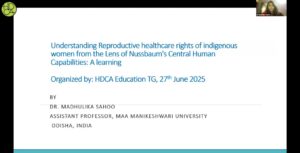Date: June 27, 2025
Time: 10:00–11:00 UTC+0
Format: Seminar
Seminar presented by Assistant Professor Dr Madhulika Sahoo (Department of Anthropology, Maa Manikeshwari University, Odisha, India) organised by the HDCA Education Thematic Group.
Abstract: The indigenous people of India are characterized by distinct cultures and a close relationship with the land they inhabit. Indigenous people make up to 5% of the world’s population 15% of such people are living in poverty. They face deprivations caused by social, economic, and political exclusion. The objective of the author is to study the reproductive healthcare status of displaced tribal women in India. In India, displacement due to development projects is pushing the tribals out of their habitat, dispossessing them of their traditional forest resources. Women and children in displacement suffer more than their male counterparts, especially in the process of moving to a new setup. This paper applies the Nussbaum Capabilities approach list and underlines the capabilities of indigenous women in post-displacement settings. The key findings of the study suggest that women lack awareness of child spacing capabilities (57%), and the unmet need for family planning is comparatively higher. More than half of the women face domestic violence that curtails their capabilities to avail reproductive healthcare services. It also reduces the immediate well-being of their children. Women in this study lack control over the decision on reproductive healthcare. Due to this, women lack social and political freedom.


